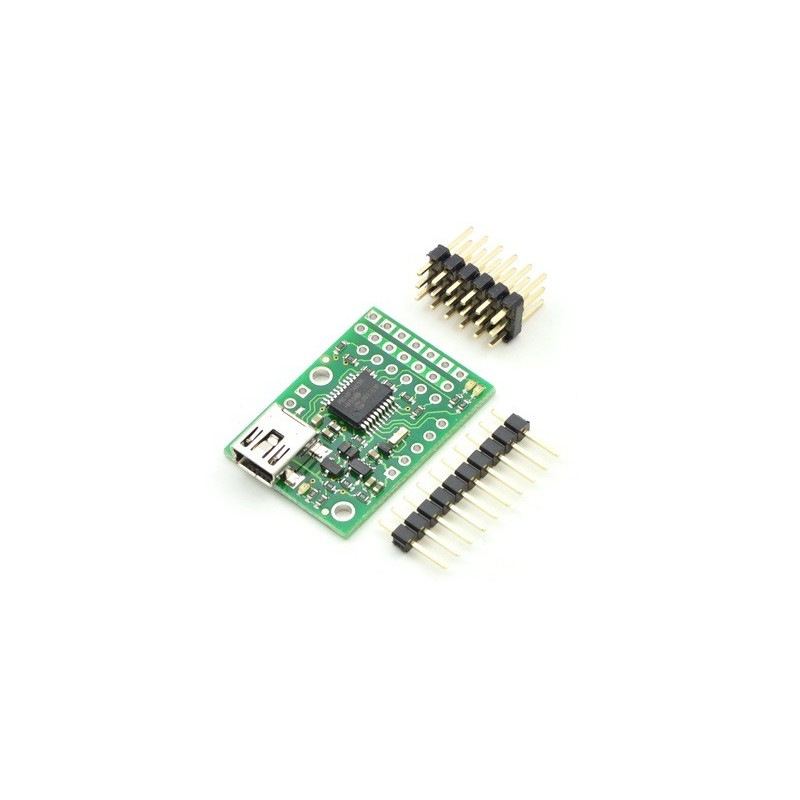



93,83 zł Netto
Micro Maestro 6-Channel USB Servo Controller (Partial Kit)

darmowa wysyłka na terenie Polski dla wszystkich zamówień powyżej 500 PLN

Jeśli Twoja wpłata zostanie zaksięgowana na naszym koncie do godz. 11:00

Każdy konsument może zwrócić zakupiony towar w ciągu 14 dni bez zbędnych pytań
Micro Maestro 6-Channel USB Servo Controller (Partial Kit)
The six-channel Micro Maestro raises the performance bar for serial servo controllers with features such as a native USB interface and internal scripting control. Whether you want high-performance servo control (0.25µs resolution with built-in speed and acceleration control) or a general I/O controller (e.g. to interface with a sensor or ESC via your USB port), this tiny, versatile device will deliver. Header pins are included but not soldered into this partial kit version (all surface-mount components are soldered).
The Micro Maestro is the smallest of Pololu’s second-generation USB servo controllers. The Maestros are available in four sizes and can be purchased fully assembled or as partial kits:
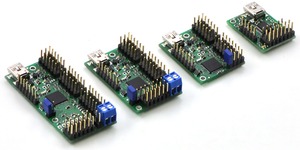 |
| Maestro family of USB servo controllers: Mini 24, Mini 18, Mini 12, and Micro 6. |
|---|
The Mini Maestros offer higher channel counts and some additional features (see the Maestro comparison table below for details).
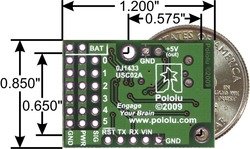 |
| Micro Maestro 6-channel USB servo controller bottom view with quarter for size reference. |
|---|
The Micro Maestro is a highly versatile servo controller and general-purpose I/O board in a highly compact (0.85"?1.20") package. It supports three control methods: USB for direct connection to a computer, TTL serial for use with embedded systems, and internal scripting for self-contained, host controller-free applications. The channels can be configured as servo outputs for use with radio control (RC) servos or electronic speed controls (ESCs), as digital outputs, or as analog inputs. The extremely precise, high-resolution servo pulses have a jitter of less than 200 ns, making these servo controllers well suited for high-performance applications such as robotics and animatronics, and built-in speed and acceleration control for each channel make it easy to achieve smooth, seamless movements without requiring the control source to constantly compute and stream intermediate position updates to the Micro Maestro. Units can be daisy-chained with additional Pololu servo and motor controllers on a single serial line.
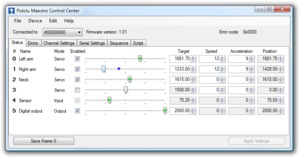 |
A free configuration and control program is available for Windows and Linux, making it simple to configure and test the device over USB, create sequences of servo movements for animatronics or walking robots, and write, step through, and run scripts stored in the servo controller. The Micro Maestro’s 1 KB of internal script memory allows storage of servo positions that can be automatically played back without any computer or external microcontroller connected.
Because the Micro Maestro’s channels can also be used as general-purpose digital outputs and analog inputs, they provide an easy way to read sensors and control peripherals directly from a PC over USB, and these channels can be used with the scripting system to enable creation of self-contained animatronic displays that respond to external stimuli and trigger additional events beyond just moving servos.
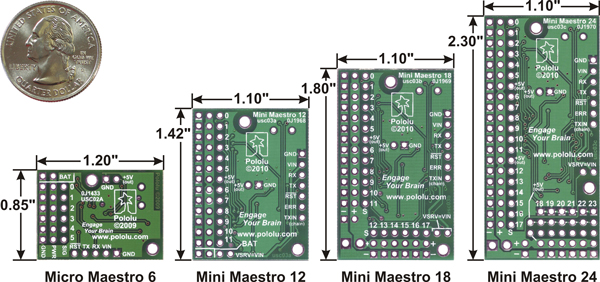 |
| Bottom view with dimensions (in inches) of Pololu Micro and Mini Maestro servo controllers. |
|---|
The Micro Maestro is available fully assembled with 0.1" male header pins installed as shown in the product picture or as a partial kit, which ship with these header pins included but unsoldered, allowing the use of different gender connectors or wires to be soldered directly to the pads for lighter, more compact installations. The Mini Maestro 12, 18, and 24 are also available fully assembled or as partial kits. A USB A to mini-B cable (not included) is required to connect this device to a computer.
|
|
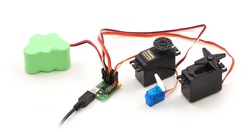 |
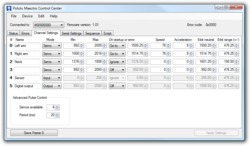 |
 |  |  |  | |
|---|---|---|---|---|
| Micro Maestro | Mini Maestro 12 | Mini Maestro 18 | Mini Maestro 24 | |
| Channels: | 6 | 12 | 18 | 24 |
| Analog input channels: | 6 | 12 | 12 | 12 |
| Digital input channels: | 0 | 0 | 6 | 12 |
| Width: | 0.85" (2.16 cm) | 1.10" (2.79 cm) | 1.10" (2.79 cm) | 1.10" (2.79 cm) |
| Length: | 1.20" (3.05 cm) | 1.42" (3.61 cm) | 1.80" (4.57 cm) | 2.30" (5.84 cm) |
| Weight(1): | 3.0 g | 4.2 g | 4.9 g | 6.0 g |
| Configurable pulse rate(2): | 33–100 Hz | 1–333 Hz | 1–333 Hz | 1–333 Hz |
| Pulse range(2): | 64–3280 ěs | 64–4080 ěs | 64–4080 ěs | 64–4080 ěs |
| Script size(3): | 1 KB | 8 KB | 8 KB | 8 KB |
1 This is the weight of the board without header pins or terminal blocks.
2 The available pulse rate and range depend on each other and factors such as baud rate and number of channels used. See the Maestro User’s Guide for details.
3 The user script system is more powerful on the Mini Maestro than on the Micro Maestro. See See the Maestro User’s Guide for details.
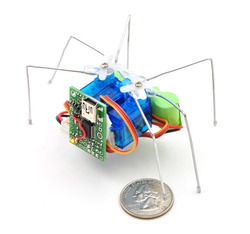 |
| Micro Maestro as the brains of a tiny hexapod robot. |
|---|
An example setup using a Micro Maestro to control a ShiftBar and Satellite LED Module is shown in the picture below and one of the videos above. Maestro source code to control a ShiftBar or ShiftBrite is available in the Example scripts section of the Maestro User’s guide.
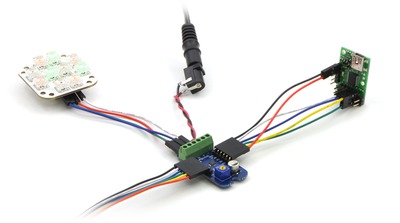 |
| Connecting the Micro Maestro to a chain of ShiftBars. A single 12V supply powers all of the devices. |
|---|
Osoba odpowiedzialna BTC Korporacja sp. z o. o. Lwowska 5 05-120 Legionowo Polska sprzedaz@kamami.pl 22 767 36 20
Kabel z wtykami USB typ A oraz mini-USB typ B, kabel o długości 1,8 m
Brak towaru
Micro Maestro 6-Channel USB Servo Controller (Assembled)
Brak towaru
Mini Maestro 24-Channel USB Servo Controller (Assembled)
Brak towaru
Moduł z 16-kanałowym sterownikiem serwomechanizmów PCA9685 przeznaczony dla minikomputerów Raspberry Pi. Płytka wyposażona jest w złącze zasilające USB Typ C. SparkFun DEV-15316
Moduł z 8-kanałowym sterownikiem serwomechanizmów. Pozwala na kontrolowanie prędkości ruchu oraz początkowej pozycji serwa. Cytron SC08A
Sterownik serwomechanizmów do zestawów FPGA TerasIC serii DE umożliwia sterowanie maksymalnie 24 serwomechanizmami. Dostarcza napięcie 6 V do zasilania serwomechanizmów. W zestawie serwomechanizm MG966R i taśma do połączenia z zestawem FPGA. P0288
Moduł z 2-kanałowym sterownikiem silników DC TB6612FNG przeznaczony do współpracy z micro:bit. Może sterować także 3 serwami. SB Components 14897
Mini Maestro 18-Channel USB Servo Controller (Assembled)
Brak towaru
Płytka generuje 16 sygnałów PWM i komunikuje się za pomocą cyfrowego interfejsu I2C, posiada wbudowany układ PCA9685. MOD-71
Moduł sterownika serwomechanizmów PCA9685 dedykowany dla minikomputerów Raspberry Pi. Pozwala na sterowanie 16 kanałami PWM. SB Components 08957
Rozszerzenie typu shield dla Arduino ze sterownikiem PWM 16-kanałowym, 12-bitowym pozwalającym na równoczesne sterowanie 16 serwomechanizmami za pomocą interfejsu I2C. Adafruit 1411
Brak towaru
Uniwersalny tester serwomechanizmów oraz regulatorów ESC. Umożliwia sprawdzenie działania serwa bez potrzeby korzystania z nadajnika i odbiornika
Ten moduł umożliwia rozszerzenie możliwości płytek serii Feather o 8 12-bitowych wyjść PWM, których można użyć np. do sterowania serwami lub diodami LED. Adafruit 2928
Micro Maestro 6-Channel USB Servo Controller (Assembled)
Brak towaru
Moduł do sterowania serwem. Parametry pracy konfigurowane są za pomocą potencjometrów umieszczonych na płytce. SparkFun WIG-13118
Brak towaru
Mini Maestro 12-Channel USB Servo Controller (Partial Kit)
Brak towaru
Płytka umożliwiająca sterowanie serwomechanizmem bez konieczności programowania. Sparkfun WIG-13872
Brak towaru
Sterownik serwomechanizmów 8-kanałów z potencjometrami to wszechstronne urządzenie umożliwiające kontrolę wielu serwomechanizmów jednocześnie. Dzięki szerokiemu zakresowi napięcia jest idealnym rozwiązaniem dla projektów robotycznych i zdalnie sterowanych aplikacji

Micro Maestro 6-Channel USB Servo Controller (Partial Kit)
